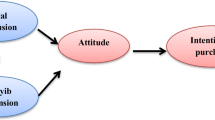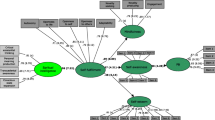Abstract
Spiritual Intelligence (SQ) construct is difficult to measure, it is quite impossible without moral values that can affect one’s attitude in the purchasing behavior process, so the paper is to report the results of a pilot study to confirm the analysis in SQ on consumer attitudes in purchasing Halal cosmetics and subsequently to confirm the intention to purchase by using the theory of planned behavior. It is a descriptive cross-sectional study among the Muslim women as the subjects, working and staying in the Klang Valley area in Malaysia. The purpose of the study is to develop a new measurement scale to unravel and decompose the underlying dimensions of SQ from the perspective of the Muslim-deemed imperative. About 200 respondents of user and nonuser of Halal cosmetics are selected. The structure equation modeling (SEM) was conducted to examine the relationships among God, society, and self, which are the dimensions of SQ to drive the Halal economy.
Access this chapter
Tax calculation will be finalised at checkout
Purchases are for personal use only
Similar content being viewed by others
References
Tieman M, Van Der Vorst JGAJ, Ghazali MC (2012) Principles in halal supply chain management. J Islam Mark 3(3):217–243
Baker EW, Al-Gahtani SS, Hubona GS (2007) The effects of gender and age on new technology implementation in a developing country: testing the theory of planned behavior (TPB). Inf Technol People 20(4):352–375
Jihan A (2013) Modeling the effects on the attitude of young adult urban Muslim women towards halal cosmetic products: new insights for championing the halal economy. Int J Educ Res 6333:1–9
Ajzen I (2006) Constructing a TPB questionnaire: conceptual and methodological considerations, 2002. J Psychol Health 2002:1113–1127
Kim HY, Chung J-E (2011) Consumer purchase intention for organic personal care products. J Consum Mark 28(1):40–47
Sommer L (2011) The theory of planned behaviour and the impact of past behaviour. Int Conf Appl Econ 10(1):91–110
Wingrove K, Rock M (1997) 121 | CSL leadership review spiritual intelligence and transformational leadership – a values perspective 122 | CSL leadership review. University of Guelph, Washington, DC, USA, pp 121–138
Mayer JD (2000) Spiritual intelligence or spiritual consciousness? Int J Psychol Relig 10(1):47–56
Faribors B, Fatemeh A, Hamidreza H (2010) The relationship between nurses’ spiritual intelligence and happiness in Iran. Procedia Soc Behav Sci 5:1556–1561
Krakas F (2010) Spirituality and performance in organizations: a literature review. J Bus Ethics 94(1):89–106.
Amran J (2010) 7 dimensions of spiritual intelligence. Procedia Psychol Behav 41:429–438
Akmar S, Samah A (2011) Prophetic best practices in business for human capital development. 1(1):7–14
Karakas F (2009) Spirituality and performance in organizations: a literature review. J Bus Ethics 94(1):89–106
Applebaum M (2009) A phenomenological psychological study of Muslim leaders’ attitudes toward connection with the prophet. Muhammad a dissertation presented to the Faculty of Saybrook Graduate School and Research Center in partial fulfillment of the requirements for the deg, March 2009
Selman V, Selman RC, Selman J, Era Q, Selman E, Consultant S, (2005) Spiritual-intelligence/-quotient. Inst Educ Sci 1(3):23–31
Randazzo PF (2012) Editor in chief. J Educ Soc Res 2(5):114–215
Razzaque M (2013) Religiosity and Muslim consumers’ decision-making process in a non-Muslim society. 4(2):198–217
Lowe SR, Dillon CO, Rhodes JE, Zwiebach L (2013) Defining adult experiences: perspectives of a diverse sample of young adults. J Adolesc Res 28(1):31–68
Awan F, Gauntlett D (2013) Young people’s uses and understandings of online social networks in their everyday lives. Young 21(2):111–132
Kari J (2007) A review of the spiritual in information studies. J Doc 63(6):935–962
King DB, Decicco TL (2009) A viable model and self-report measure of spiritual intelligence. Int J Transpers Stud 28(2000):68–85
Acknowledgment
The authors would like to thank the Ministry of Education (MOE) for providing the grant through the Principal Investigator Support Initiative Grant (PSI) and Universiti Teknologi MARA for the support and for facilitating this research.
Author information
Authors and Affiliations
Corresponding author
Editor information
Editors and Affiliations
Rights and permissions
Copyright information
© 2016 Springer Science+Business Media Singapore
About this paper
Cite this paper
Hashim, A.J.C.M., Musa, R. (2016). Factorial Structure of Spiritual Intelligence Towards Purchasing Decision Towards Halal Cosmetic Product. In: Pyeman, J., Wan Rashid, W., Hanif, A., Syed Mohamad, S., Tan, P. (eds) Proceedings of the 1st AAGBS International Conference on Business Management 2014 (AiCoBM 2014). Springer, Singapore. https://doi.org/10.1007/978-981-287-426-9_8
Download citation
DOI: https://doi.org/10.1007/978-981-287-426-9_8
Publisher Name: Springer, Singapore
Print ISBN: 978-981-287-425-2
Online ISBN: 978-981-287-426-9
eBook Packages: Business and ManagementBusiness and Management (R0)




